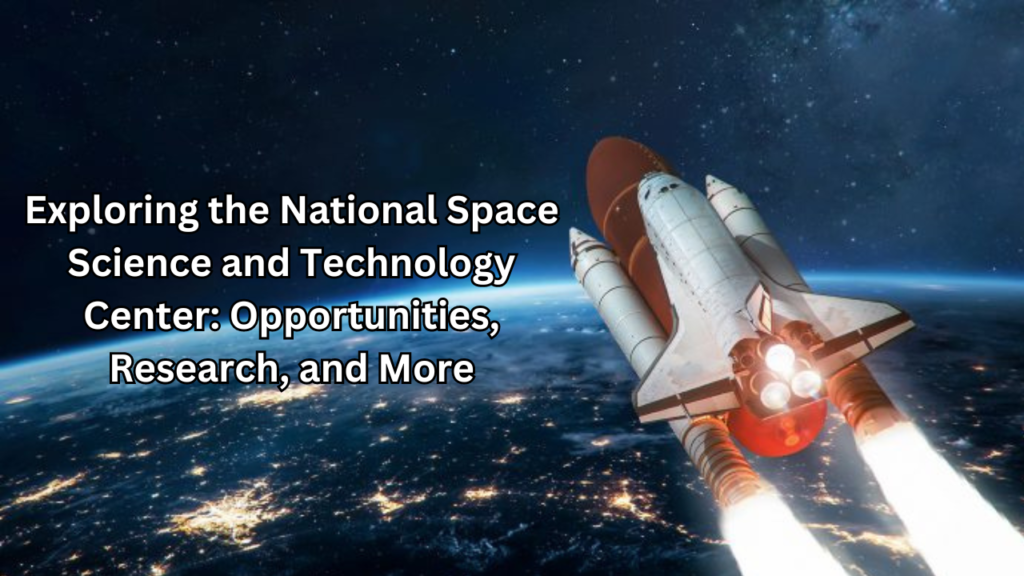
Table of Contents
Introduction
The National Space Science and Technology Center (NSSTC) serves as a pivotal institution in the realm of space exploration and research, dedicated to advancing our understanding of the cosmos and harnessing the potential of space science for societal benefit. Located in the United Arab Emirates, the NSSTC plays a critical role in promoting innovation and education in space science and technology, which are increasingly essential in today’s rapidly evolving technological landscape.
Space science and technology have become integral to addressing various global challenges, from climate change and natural disaster management to enhancing communication and navigation systems. Recognizing this significance, the UAE has committed itself to advancing space science through strategic investments, innovative programs, and international collaborations. The establishment of the National Space Science and Technology Center is a testament to the UAE’s ambition to become a leader in the field of space exploration, positioning itself at the forefront of scientific discovery and technological advancement.
What is the National Space Science and Technology Center?
The National Space Science and Technology Center (NSSTC) is a state-of-the-art facility that embodies the UAE’s commitment to advancing space science and technology. Established to drive innovation and scientific research, the NSSTC focuses on developing and implementing cutting-edge technologies that enhance our understanding of space and its myriad applications. The mission of the NSSTC is to promote research in space technology, foster collaboration among academic institutions, and develop a skilled workforce capable of addressing the challenges of space exploration.
At the heart of its operations, the National Space Science and Technology Center plays a crucial role in advancing space research and technology development. It serves as a hub for scientific inquiry, bringing together experts from various disciplines to collaborate on projects that range from satellite technology to space exploration missions. The center also engages in partnerships with international space agencies and organizations, allowing it to stay at the forefront of global advancements in space science. By focusing on innovation and research, the NSSTC aims to position the UAE as a leader in the field of space science, contributing to the broader goals of humanity’s exploration and understanding of the universe.
Key Facilities and Programs
The National Space Science and Technology Center (NSSTC) boasts a range of cutting-edge facilities designed to support its mission of advancing space science and technology. Among these key facilities is the advanced satellite operations center, which is equipped to manage and monitor satellite missions, ensuring optimal performance and data collection. Additionally, the NSSTC features a high-tech laboratory dedicated to research and development in areas such as remote sensing, astronomical studies, and space weather analysis. These facilities enable scientists and researchers to conduct experiments and analyses that contribute to a deeper understanding of space phenomena.
The NSSTC also hosts several research programs and projects aimed at addressing critical challenges in space science. These initiatives include developing innovative satellite technologies, conducting atmospheric studies, and exploring planetary science. By focusing on practical applications, the NSSTC enhances the UAE’s capabilities in space exploration while also contributing valuable insights to the global scientific community.
Collaboration is a cornerstone of the National Space Science and Technology Center’s approach. The NSSTC actively partners with leading academic institutions, research organizations, and international space agencies to leverage expertise and resources. These collaborations not only enhance the center’s research capabilities but also facilitate knowledge exchange and joint projects that propel advancements in space science and technology. Through these efforts, the NSSTC positions itself as a vital contributor to the global space research landscape.
Career Opportunities at the National Space Science and Technology Center
The National Space Science and Technology Center (NSSTC) offers a wide range of career opportunities for individuals passionate about space science and technology. Available positions at the NSSTC encompass various fields, including engineering, research, project management, and education. From satellite systems engineers to data analysts and research scientists, the NSSTC seeks skilled professionals who are eager to contribute to groundbreaking projects that advance our understanding of space and its applications.
To qualify for roles at the National Space Science and Technology Center, candidates typically need a strong educational background in relevant fields such as engineering, physics, or computer science. In addition to academic qualifications, the NSSTC values skills such as critical thinking, problem-solving, and teamwork. Familiarity with space-related technologies and research methodologies can also enhance an applicant’s prospects. For certain positions, advanced degrees or specialized certifications may be required.
The application process for jobs at the National Space Science and Technology Center is straightforward but competitive. Interested candidates should regularly check the NSSTC website for current job postings and application guidelines. When applying, it’s important to tailor your resume and cover letter to highlight relevant experiences and skills that align with the specific position. Potential applicants are encouraged to showcase their passion for space science and technology, as well as any relevant research or project experience. Networking within the space science community and participating in related events can also provide valuable connections and insights into opportunities at the NSSTC, helping candidates stand out in this exciting field.
Research and Education Initiatives
The National Space Science and Technology Center (NSSTC) is deeply committed to fostering education and research in space science and technology. One of its flagship educational programs is the UAEU Space Professor initiative, which collaborates with the United Arab Emirates University (UAEU) to promote academic excellence and research in space-related fields. This program aims to develop a new generation of scientists and engineers equipped with the knowledge and skills necessary to tackle the challenges of space exploration. By engaging students in hands-on projects and research activities, the NSSTC and UAEU work together to cultivate interest and expertise in space science among young professionals.
In addition to the UAEU Space Professor initiative, the NSSTC houses the Center for Space Science, which focuses on advancing research in various domains such as astronomy, planetary science, and Earth observation. Through this center, the NSSTC supports a wide range of research projects, providing valuable resources and expertise to researchers and students alike. These initiatives not only enhance the educational landscape in the UAE but also contribute significantly to global advancements in space science.
Training and development in space science and technology are crucial for maintaining a competitive edge in this rapidly evolving field. The National Space Science and Technology Center emphasizes the importance of continuous learning and professional development through workshops, seminars, and collaborative research opportunities. By investing in the training of both students and professionals, the NSSTC ensures that the UAE remains at the forefront of space exploration and innovation, fostering a culture of curiosity and discovery that inspires future generations.
Related Institutions and Collaborations
The National Space Science and Technology Center (NSSTC) collaborates with various related institutions to enhance its research and educational initiatives. One notable partner is the National Space Science and Technology Center for Public Policy and Leadership, which focuses on integrating space science into public policy and decision-making processes. This collaboration ensures that the advancements in space research are effectively translated into actionable policies that can benefit society at large. By working together, these institutions create a comprehensive framework that fosters the growth of space science in both academic and governmental contexts.
Additionally, the NSSTC collaborates with a variety of universities, research centers, and international space agencies. These partnerships enable knowledge exchange, joint research projects, and access to advanced technologies and expertise. For instance, collaboration with global space agencies allows the NSSTC to participate in international missions and research endeavors, further solidifying its position as a key player in the global space science community.
Through these collaborations, the National Space Science and Technology Center enhances its capacity for innovation and research. By pooling resources and expertise with related institutions, the NSSTC not only broadens its research horizons but also strengthens its educational programs. This collaborative approach cultivates a rich environment for scientific inquiry and fosters a culture of cooperation that drives advancements in space science and technology, ultimately benefiting the UAE and the global community.
Conclusion
In conclusion, the National Space Science and Technology Center (NSSTC) stands as a vital institution at the forefront of both national and international space endeavors. Its commitment to advancing space science and technology not only strengthens the UAE’s position in the global space community but also contributes to significant scientific discoveries that benefit humanity. Through its state-of-the-art facilities, innovative research programs, and collaborative partnerships, the NSSTC plays an essential role in fostering a culture of exploration and innovation.
For those interested in pursuing careers or education in space science and technology, the NSSTC offers a plethora of opportunities that can help you make a meaningful impact in this exciting field. Whether you are a student looking to engage in groundbreaking research, a professional seeking to enhance your skills, or an enthusiast eager to learn more about space, the NSSTC invites you to explore its programs and initiatives. Embrace the chance to be part of a community that is shaping the future of space science and contributing to our understanding of the universe.
FAQs
What do you do at the National Space Science and Technology Center?
At the National Space Science and Technology Center (NSSTC), a wide range of activities take place that focus on advancing space science and technology. These include conducting cutting-edge research in areas such as satellite technology, remote sensing, and planetary science. The NSSTC also engages in public outreach initiatives, hosting educational programs and events to inspire the next generation of scientists and engineers. Through partnerships with academic institutions and international space agencies, the NSSTC facilitates collaboration on various projects aimed at expanding our understanding of space and its applications.
What is NSSTC?
The acronym NSSTC stands for the National Space Science and Technology Center. It plays a significant role in the United Arab Emirates’ space strategy, serving as a hub for research, innovation, and education in space science. The establishment of the NSSTC reflects the UAE’s commitment to becoming a leader in space exploration and technology, fostering a sustainable and knowledge-based economy. By prioritizing space science, the NSSTC supports national goals while also contributing to global advancements in the field.
How do I get into space science and technology?
To enter the field of space science and technology, aspiring individuals can pursue various educational pathways. A solid foundation in subjects like physics, engineering, and computer science is essential. Many universities offer specialized programs in aerospace engineering, astronomy, and space science. Additionally, internships and research opportunities at institutions like the National Space Science and Technology Center can provide valuable hands-on experience. Engaging in networking events and joining professional organizations can also help in finding career opportunities in this dynamic field.
What is space science and technology?
Space science and technology encompass the study of celestial phenomena and the development of technologies used to explore and understand space. This field includes various disciplines, such as astronomy, astrophysics, planetary science, and space engineering. Applications of space science and technology are vast and include satellite communications, Earth observation, navigation systems, and space exploration missions. Through the efforts of institutions like the National Space Science and Technology Center, advancements in this area continue to drive innovation and improve our understanding of the universe.
